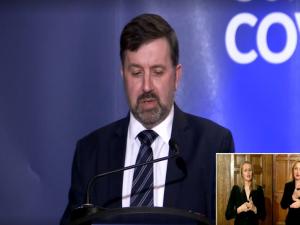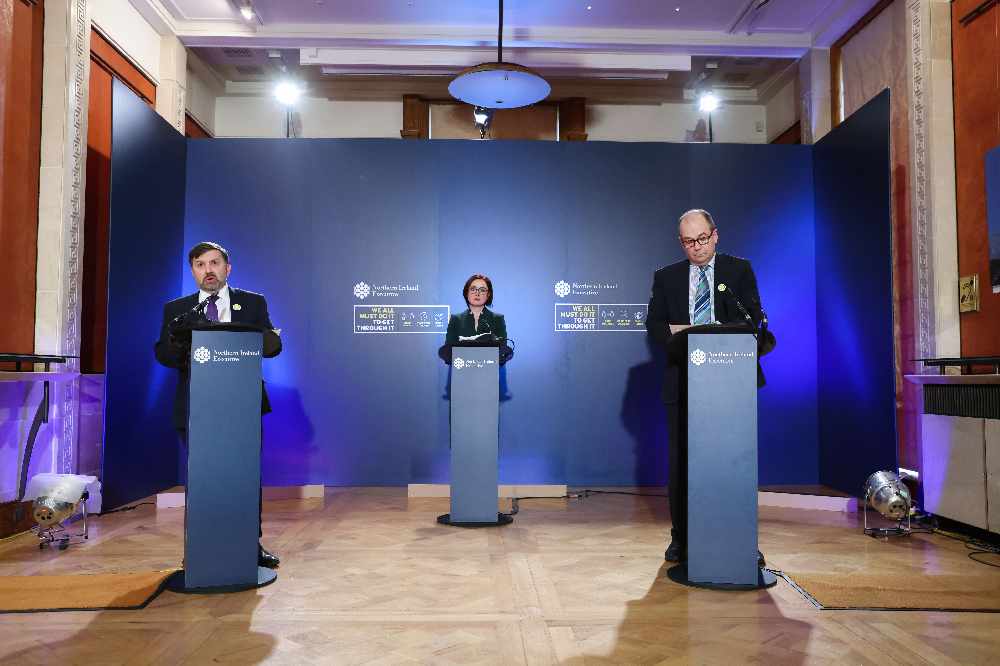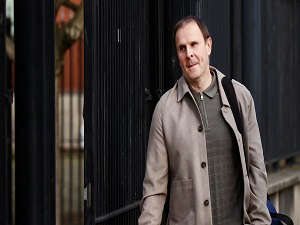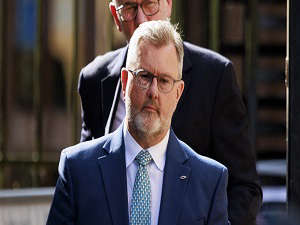
By David Young, PA
Northern Ireland’s health minister has urged executive colleagues to speak with a united voice in supporting Stormont’s lockdown exit plan.
Robin Swann warned against mixed messaging from within the devolved five-party coalition as he defended a strategy that is under fire amid criticism it lacks detail and dates.
Mr Swann’s comments come after DUP First Minister Arlene Foster acknowledged that her party wanted a quicker exit from lockdown but had agreed to the plan in order to ensure consensus was reached.
The publication of the blueprint on Tuesday has also seen members of the DUP and Sinn Fein, the administration’s two leading parties, criticise each other’s handling of different aspects of the Covid-19 response.
Mr Swann, an Ulster Unionist minister who last week claimed politicking within the executive had cost lives, said it was vital that ministers stood together over the plan as it was rolled out in the weeks and months ahead.
Business representatives and other members of the public have criticised the executive’s decision to exclude indicative dates in its phased exit strategy.
Ministers have insisted Covid-19 is too unpredictable to provide timelines for lifting restrictions and have said decisions will instead be made on the basis of scientific and medical data.
“When the executive stands together and proposes that same single message, that we can get through this, that we have to take those cautious steps that have been laid out in the plan, that have been supported by all five parties, that’s when the people of Northern Ireland support us and what we need to do,” Mr Swann said at his weekly Stormont press conference.
“That’s when the people of Northern Ireland support our health service in how it reacts to the pressures that Covid-19 actually brings to it.
“So what I think we’ve seen is a document produced that gives us that direction, that has been supported unanimously and was signed off by all five parties around the executive table, and I would ask them for a consistency in message that we support the plan that is laid out in this document.
“I don’t think it’s perfect. But when you look at what other governments and other areas have produced as well, no one’s been able to produce a perfect plan to deal with this virus because this virus does not follow plans and does not follow calendars.”

Health Minister Robin Swann, Interim Mental Health Champion Siobhan O'Neill and Chief Medical Officer Dr Michael McBride during during a Covid-19 update press conference in Parliament Buildings, Stormont
Mr Swann said the plan was deliberately cautious.
“It’s about not rushing out of this lockdown so we end up rushing into another one,” he said.
Mr Swann insisted providing no dates was better than offering timetables that then had to be delayed or scrapped due to changes in how the virus was spreading.
“It’s about not giving false hope, or false dates as well,” he said.
“Because that raises the level of expectation that can cause more pressure and cause more upset and that’s why the executive has taken this approach.”
The executive’s Pathway to Recovery plan focuses on nine key areas – retail, hospitality, education and young people, work, culture, heritage and entertainment, sports and leisure, travel and tourism, worship and ceremonies, home and community.
Each pathway will emerge from restrictions in five phases, with some likely to progress at a faster pace than others.
The stages of restrictions begin with lockdown then progress to cautious first steps, gradual easing, further easing, and preparing for the future.
The minister defended the plan’s lack of detail around what data points needed to be reached to prompt a move between phases.
He said there were a “multitude of measurables”.
Mr Swann said those included the reproductive rate of the virus; hospital capacity rates; the effectiveness of the test, trace and protect system; population immunity levels and vaccine rollout progression; and the impact of new variants.
“There is no magical formula that we can simply type into a computer and get an answer that says ‘yes you move forward’ or ‘no you don’t’,” he added.
Chief medical officer Dr Michael McBride summed up the question that needed to be answered before the region could step out of lockdown.
“I think the basic question is – is the epidemic under control, yes or no?” he said.
Dr McBride said a “cautious step-by-step” approach to relaxing the restrictions would provide an additional line of defence along with the vaccine rollout programme.
In terms of the rollout, Mr Swann hailed progress, reporting that as of Wednesday almost 583,000 vaccines had been administered in the region, about 545,000 of which were first doses.
He said supplies of the Oxford/Astra Zeneca jab were set to increase “very significantly” in the weeks ahead.
“The vaccination programme will be scaled up accordingly and plans to that effect are being finalised this week,” he added.
There were four additional Covid-19 linked deaths in Northern Ireland reported by the Department of Health on Wednesday, along with another 226 positive cases of the virus. On Wednesday morning, there were 307 Covid patients in hospital, 31 of whom were in intensive care.


 Woman assaulted while jogging in West Belfast
Woman assaulted while jogging in West Belfast
 Leading loyalist Winston Irvine sentenced to 30 months for firearms offences
Leading loyalist Winston Irvine sentenced to 30 months for firearms offences
 Rescue operation to free 40 cows after lorry overturns on motorway
Rescue operation to free 40 cows after lorry overturns on motorway
 New date set for trial of former DUP leader Jeffrey Donaldson and wife
New date set for trial of former DUP leader Jeffrey Donaldson and wife